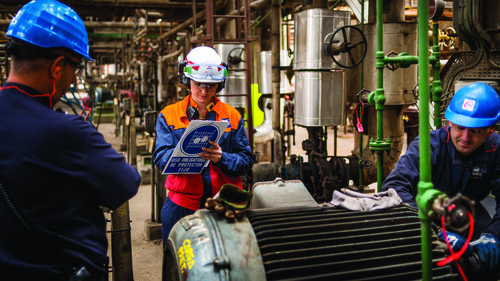
Repsol is furthering its commitment to the circular economy by installing a new recycled plastics production line at its Puertollano Industrial Complex in Spain. The facility, which will be operational by the end of 2024, will have a capacity to manufacture 25,000 tons of recycled plastics per year, almost doubling the current capacity. The investment of €26 million will help Repsol meet the European and Spanish regulations that aim to achieve a recycled content target of 30% for plastics packaging by 2030. The company is also investing in other waste management and recovery companies to make the plastics sector more sustainable.
Repsol takes another step forward in its commitment to the circular economy as the cornerstone of its transformation to become a company with zero net emissions by 2050.
The company will install a new recycled plastics production line (Reciclex range) with a capacity to manufacture 25,000 tons per year at its Puertollano Industrial Complex, making this center a benchmark for the circular economy in the Iberian Peninsula.
The new unit, which will come into operation at the end of 2024, will almost double the current capacity (16,000 tons/year) and generate 200 direct, indirect and induced jobs throughout the different phases of construction, start-up and operation.
With an investment of €26 million, it will manufacture plastics used to produce rigid and flexible packaging for non-food use, such as cleaning product containers or product packaging sacks. Specifically, it will process high and low-density polyethylene (HDPE and LDPE) with a recycled plastic content of 10% and 80%.
This investment is in line recent European and Spanish regulations, which aim to achieve the recycled content target for plastics packaging of 30% by 2030.
The Puertollano Industrial Complex thus advances in its transformation process, becoming a reference center in the recycling and recovery of plastic materials, to respond in a sustainable way to the new demands of society by generating highadded-value products with a lower carbon footprint.
In addition to the new recycled plastic production line, Puertollano will -start up - the first polyurethane foam recovery plant this year in Spain and the Iberian Peninsula.
In addition to the investments in the Puertollano complex, the company's commitment to the circular economy has materialized with Repsol's entry as a shareholder in Acteco, an integrated waste management and recovery company, and in Enerkem, a leading technology company in waste gasification. In this way, Repsol provides its customers' technologies, including product eco-design, and mechanical and chemical recycling, to make the plastics and polyurethane foam sector more sustainable by offering essential products for society with high percentages of recycled material and, therefore, with a significant reduction in their carbon footprint.